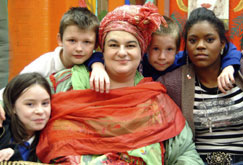 Camila Batmanghelidjh was born in
Tehran into fairy-tale privilege. She now works with underprivileged children in London. Vida Adamoli charts her journey.
Camila Batmanghelidjh was born in
Tehran into fairy-tale privilege. She now works with underprivileged children in London. Vida Adamoli charts her journey.
In the midst of dazzling opulence nine-year-old Camila became aware of a desire to help children less fortunate than herself. The Islamic Revolution destroyed her privilege, condemned her to exile - but focused her mission.
Her father, a hugely rich Iranian businessman, was owner of a luxury hotel frequented by the wealthy elite. Her formative years were spent being chauffeured between her palatial home and the hotel by police bodyguards. The ice rinks and swimming pools were her personal playground and staff catered to her every need. Home life was equally glittering. Every night her father and Belgian mother threw lavish parties. She and her brother would lie on their stomachs peaking over the stairwell at immaculate black-clad waiters serving the crowned and bejewelled guests milling around below.
It was in the midst of this dazzling opulence that Camila first
became aware of a desire to help children less fortunate than herself.
She was very young, only nine years old, yet the desire was ‘very
powerful and fully formed’. She describes it as a ‘gift’.
And
then the fairy tale ended. In 1975, aged twelve, Camila was sent to the
UK to be privately educated. Three years later Iran was gripped by a
revolution that transformed Iran from a monarchy under the Shah to an
Islamic Republic controlled by Ayatollah Khomeini. Her father was
arrested and all his assets seized. At the same time Iran’s
Revolutionary Guards, wiping out her entire personal history, burnt
Camila’s childhood possessions. Camila’s older sister, studying at
Manchester University, was plunged into despair. Fearing her father
would be executed she took her own life.
Overnight the teenage
girl’s life underwent terrifying change. Suddenly Camila found herself
with no money and no status. With the help of her teachers she applied
for political asylum. She also persuaded the manager of a British bank
where her father had an account to pay for her outstanding school fees.
She still had to cover her living expenses, however. Remembering the
desire of her nine-year-old self she started working with children.
First as a nursery nurse, then as a trained psychotherapist.
Soon
Camila was counselling children referred to her by local authorities.
Many of her clients quickly dropped out, however, failing to attend
more than a few therapy sessions. ‘I very quickly realised the system
was flawed,’ she says. ‘It wrongly assumed there was always a
responsible adult to take the children to sessions. I wanted to set up
a structure where the children could ask for help directly. I wanted to
develop something that would meet these children's needs where they
were.’
At the age of twenty-five Camila set up her first
charity, Place2Be, which today provides therapy for 20,000 children.
She financed it with money that should have been paying the mortgage on
her two-bedroom £70,000 north London flat. The same flat has since been
re-mortgaged twice to help finance her second charity, Kids Company.

Kids
Company is rooted in Camila’s childhood vision to help disadvantaged
children. It is a place where vulnerable inner city children and young people can get practical, emotional and educational support. The children turning up on
its doorstep are all in need, suffering the consequences of
neglect and sexual, physical or emotional abuse. Kids Company's multi-disciplinary services are holistic, child-centred and based on the belief
that all children and young people deserve to be loved and cared for. Everyone working there strives to provide an environment where children
and adults can interact with trust and empathy.
In 2006 Kids
Company was ten years old. During that time it has helped transform the
lives of thousands of youngsters. Statistics can be dry but these
describe a world of hope:
11,000 children and young people accessed its services.
700 children accessed its services at the drop in centre, the Arches II.
1,500 volunteers contributed 27,000 hours to Kids Company work.
160 young people enrolled onto the Urban Academy’s educational programme.
800 young people accessed Kids Company services on Christmas day.
Over 1300 corporate volunteers from 23 different companies gave Kids Company their support.
Money is always a problem and much of Camila's time is devoted to fundraising. In 2006 she won Woman of the Year
award, from The Women Of The Year Lunch And Assembly (a charity created
in 1955 to celebrate the achievements of women) She was also named
Ernst & Young's Social Entrepreneur of the Year in 2005. She works
12 hours a day, seven days a week at the Kids Company centre in
Peckham, London, and has not taken a holiday for 11 years.
Read Camila's article on youth knife crime.
